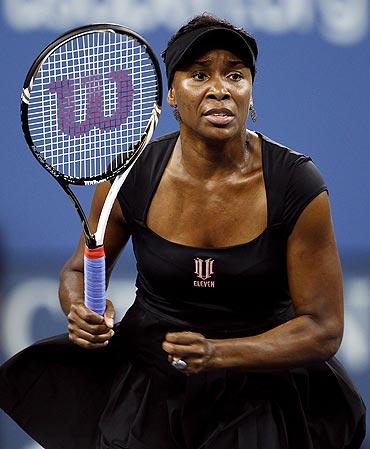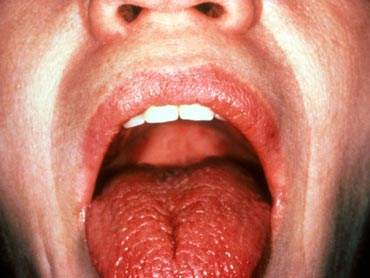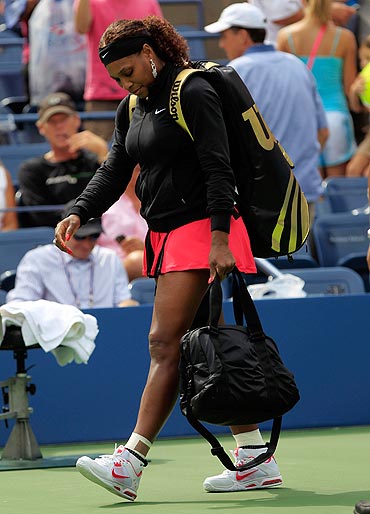 | « Back to article | Print this article |
Knowing Venus Williams's illness -- Sjogren's Syndrome
When former US Open champion Venus Williams revealed her illness that forced her to withdraw midway through the tournament, she brought into focus a disease that is not heard of often but is suffered by many the world over.
Venus pulled out of the last Grand Slam of the year on Wednesday, revealing she is suffering from an autoimmune disease called Sjogren's Syndrome.
Sjogren's (pronounced SHOW-grens) Syndrome is a chronic disease where white blood cells attack moisture-producing glands. The most common symptoms are dry eyes and dry mouth but the illness can also cause dysfunction of other organs and body systems.
Sometimes the gland responsible for keeping the vagina moist is also affected, resulting in vaginal dryness. There can also be pain and stiffness in the joints and aching muscles.
The Sjogren's Syndrome Foundation states that nine out of 10 patients are women and most experience extreme fatigue and joint pain.
Sjogren's Syndrome can develop at any age. However, majority are diagnosed after the age of 40.
No two people have the same set of symptoms.
It takes seven years to diagnose Sjogren's Syndrome
According to sjogrens.org, on an average, it takes nearly seven years to receive a diagnosis of Sjogren's syndrome.
When this disease affects a person, the healthy tissues and cells are mistakenly attacked by the body's own immune system.
A person with Sjogren's Syndrome has abnormal antibodies circulating in the blood that attack healthy tissues as if they were harmful pathogens, such as infectious viruses or bacteria.
The disease is prevalent in India on a large scale with Gujarat having 100 cases of the syndrome. To create awareness and help patients deal with the disease that is still unknown in India, a Sjogren's Support Group was started by patient volunteers and their families.
Causes of Sjogren's Syndrome not known
Doctors classify Sjogren's Syndrome as either primary or secondary Sjogren's syndrome:
In primary, the condition does not develop as a result of another condition, it is not the consequence of another condition.
In secondary, the condition develops because of or alongside another condition, such as lupus or rheumatoid arthritis.
Though incurable, Sjogren's is generally not fatal as long as it is properly diagnosed. People with Sjogren's face an increase risk of lymphoma, a potentially deadly cancer.
Doctors don't know the precise causes but think it has a hereditary basis. In addition, they suspect it is triggered by exposure to some pathogen, like a virus or bacterium.
'Hopefully she'll stay around for the women's game for a long time'
Taking into account the nature of the illness, it's tough to predict if Venus will make a comeback to the tennis circuit or not. However, good wishes have kept flowing from top players after the word about her illness spread.
"I can only wish her the best. She's been a great player, a great champion," Federer said when quizzed about Venus.
"Hopefully she'll stay around for the women's game for a long time," he added.
Andy Roddick, who is very close to Williams family, said: "I'm very concerned. If Venus isn't playing at the US Open, it's got to be something. She didn't withdraw because she's sneezing too much."
Three-time champion Serena Williams said on Thursday she would turn her concern over sister Venus's illness into motivation at the US Open.
"Now, if anything, it should motivate me more."
'I think she's really happy now that she knows what it is after all this time'
The five-time Wimbledon champion told ABC's "Good Morning America" television program Thursday that she had trouble with stamina, had swelling, numbness and fatigue, but was confident she could get back on the court.
Serena, 29, said "all I can do is just pray," before adding that just knowing what was sapping her energy was a key step forward for her sister.
"I know she's a fighter and she's really strong. She's great. I think she's really happy now that she knows what it is after all this time."
Other sportspersons known to have Sjogren's Syndrome are American baseball player Tim Raines and LPGA pro golfer, Canada's Salimah Mussani.




